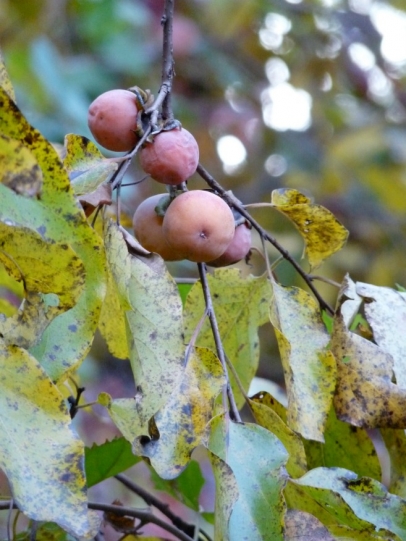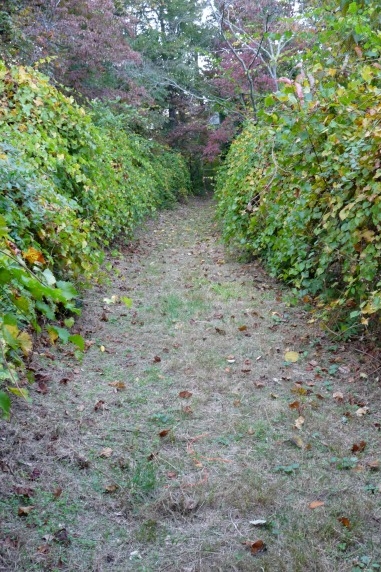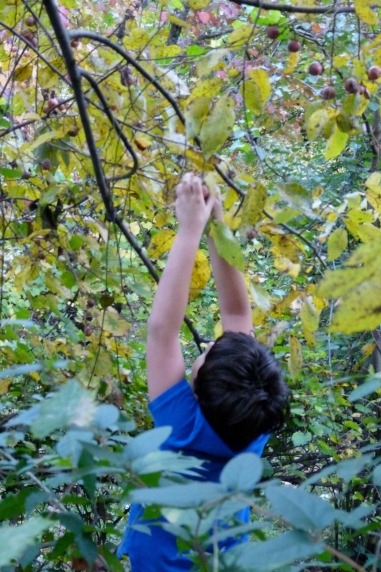Wild Persimmons on Paris Mountain
"There’s no civilized way to eat a persimmon,” says Jo Hackl, a statement I take as fact because Jo is easily the most civilized woman I know. She and I have been odd-couple friends for a handful of years now, drawn together by love for writing, eating and gardening. She politely ignores the fact I’m always late, for everything. I admire her flawless sense of order.
For instance, on Sundays, the Hackls extend no invitations and accept no invitations. Jo is an attorney at Wyche Law Firm, as well as a strong community advocate in various roles around town, and Bob is a chef and co-owner of the neighborhood favorite, Augusta Grill. They are the parents of three busy teenagers—Abby, Catherine and Robert. Monday night is date night.
This not-Sunday-or-Monday, late autumn, we’re tramping through the family muscadine vineyard looking for a thicket of volunteer wild persimmon trees, a fruit with a long history in the rural south that’s enjoying a recent renaissance in more white tablecloth establishments. Its star turn seems to have followed the same arc as ramps, acorn flour and lamb’s quarters: foods we used to gather, forgot about, and now place in the realm of foraged treasures. Jo is a bit of an expert on foraging. In one of her many lives, she is also the author of young adult novels; one of her heroines runs away and lives off what she can eat in the Mississippi pine forest for a season. In other words, if Jo says it can be eaten, I know she’s come across it in a book, talked to somebody who’s tried it, and probably eaten it herself.
I have strong memories of a wild persimmon tree that hung over our driveway in the house I was raised in, the fruits messily splattered under the basketball goal. The woman who kept us in the afternoons used to make preserves from what she collected off the ground, which seemed nutty to us. Our father was a farmer; we knew the difference between what you bought in a grocery store and what you picked yourself, and the stuff on the ground was for the birds. But the persimmons still on the tree were eye-crossingly tart. It didn’t seem like a good idea to eat them either.
When ripe, a wild persimmon tastes like a sweet squash or pumpkin, but with the soft fiberous texture of a mango or a plum, the fruit clinging to a substantial pit. At the Hackls, collecting is a family adventure. Jo advocates doing like the foxes and raccoons do: shake the tree to get the ripe ones to fall, slingshot branches into other branches, look out. Wild persimmons are ripe to the touch, a frosty orange color sunsetting to purple, with their husks furled back like little hats: “a fruit to engage with,” Jo says, “on all levels.” She insists the seeds are best spit into the far distance, which is also the best way to get more persimmon trees.
Jo and Bob have 22 acres atop Paris Mountain, around two of which they cultivate, with everything from muscadines to blackberries, bananas to sassafras, mulberries, borage, a dog and a swimming pool. The Hackls moved to Greenville in 1989 from Birmingham, where Bob worked in the kitchen at Frank Stitt’s venerable Highlands Bar and Grill. He opened the Augusta Grill in 1993. In what was something of a culinary desert then, the Hackls started their garden out of necessity, growing fresh herbs, haricot vert and heirloom tomatoes. Their interests evolved from there.
Jo believes in pushing the planting zone as far as her banana trees will take her, and you can see the same wonder on her son Robert’s face when he finds a ripe pomegranate on the poolside bush. Jo shows me her pineapple plant, which has borne fruit a couple years in a row. I wonder what seed catalogue or internet source, but she says they just cut the top off a grocery store pineapple and gave it a whirl.
“Gardening is a good life lesson,” Jo says. “Some years are tomato years, some cucumber years, and some organic peach years.” Even the wild stuff has its season.







